
Map credit: Robert White
A number of tools and funding opportunities exist for work in the Calumet region.
I love the energy at events where I see so many people and organizations doing such great work in the region, and I especially like to be able to support that work by providing venues for learning about new resources and networking with other like-minded people!
On Tuesday, Aug. 27, the Metropolitan Planning Council (MPC) hosted the Tools and Funding for Stormwater Management, Habitat Restoration and Waterfront Access in the Calumet Region workshop for an audience of 75 municipal representatives, engineers and consultants, nonprofit partners and other interested parties, including several groups from Indiana. The workshop was an opportunity to spread the word to those in the Calumet region about the new Chi-Cal Rivers Fund, announced a few weeks ago, as well as to discuss other funding opportunities and resources for those doing water- and environment-related work in Chicago’s South Side, south suburbs and northwest Indiana.
We wanted to help make sure that those in the Calumet region are aware of all the funding and other resources available to help their efforts, so we pulled together partners involved with making those tools available to actually come to the south suburbs and talk to people about those resources directly. As part of the workshop, we also put together an overview guide of the various resources available, including resources not presented at the workshop.
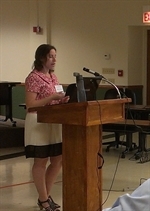
ArcelorMittal, represented at the workshop by Heather Loebner, is a partner in two public-private partnership funds: Chi-Cal Rivers Fund and Sustain our Great Lakes.
Heather Loebner, Executive Director for Corporate Responsibility Americas at ArcelorMittal, presented on two different funding programs. The Chi-Cal Rivers Fund was created by a consortium of public, private and foundation partners to “restore the health, vitality and accessibility of the waterways in the Chicago and Calumet region by supporting green stormwater infrastructure, habitat enhancement and public-use improvements.” The fund has $1.1 million to distribute in grants between $50,000 to $300,000 (with 1:1 match) for projects related to green stormwater infrastructure, habitat enhancement and public-use improvements within the watersheds of the Chicago Area Waterway System and the Grand and Little Calumet Rivers. Because the fund is brand new, there is still some flexibility with how they will determine awards, so if you’re not sure if your project is eligible, you should go for it—but do so quickly, as the deadline is Sept. 17, 2013. Heather’s presentation on the Chi-Cal Rivers Fund is available here.
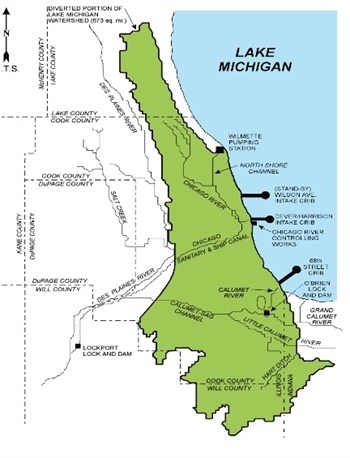
Caption: Illinois applicants to Sustain our Great Lakes are eligible if they are within the historic Lake Michigan watershed.
Source: Before the Wells Run Dry, Metropolitan Planning Council
Heather also discussed Sustain our Great Lakes (SOGL), another public-private partnership of which ArcelorMittal is a part. SOGL was formed to “sustain, restore and protect fish, wildlife and habitat in the Great Lakes basin by leveraging funding, building conservation capacity and focusing partners and resources toward key ecological issues.” The 2014 funding opportunity will be announced in January, and they anticipate having $5 to 9 million to distribute in grants between $25,000 to $1.5 million (with 1:1 match) for projects related to habitat restoration, delisting of beneficial use impairments and private landowner technical assistance within the Great Lakes basin. There was uncertainty at the workshop whether Illinois applicants needed to be in the current versus historic Lake Michigan watershed, but Heather has confirmed that projects in the historic watershed are eligible. Watch for a January 2014 announcement of the next grant cycle. Heather’s presentation on SOGL is available here.
Christine Davis, Environmental Protection Specialist at the Ill. Environmental Protection Agency (Ill. EPA), presented on two programs their agency has for stormwater and watersheds. The Illinois Green Infrastructure Grant (IGIG) supports “green infrastructure stormwater management best management practices.” The program was renewed for a fourth year and will have $5 million to distribute in grants between $15,000 to $3 million (with 15 to 25 percent match) for projects related to combined sewer overflow rehabilitation, stormwater retention and infiltration and green infrastructure small projects within Illinois Municipal Storm Sewer System or combined sewer overflow areas. If you have questions on how it is to have this grant, MPC’s Milwaukee Avenue Green Development Corridor grant program was funded through the IGIG program. The deadline is December 15, 2013.
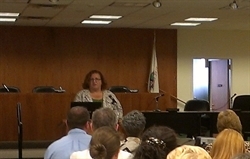
Ill. EPA, represented at the workshop by Christine Davis, offers green infrastructure and watershed grants.
Christine also presented on Ill. EPA’s Nonpoint Source Pollution Control (commonly referred to as Section 319) grant program. Section 319 addresses “water quality issues relating directly to nonpoint source pollution,” generally through watershed management plans. The program has $3 million to distribute in grants between $50,000 to $1.2 million (with 40 percent match) for projects related to water quality protection statewide. The deadline is Aug. 1, annually. Christine’s presentation on both IGIG and Section 319 is available here.
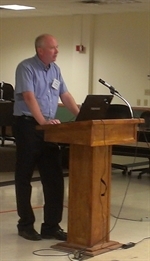
MWRD, represented at the workshop by John Murray, wants to partner with communities on stormwater issues.
John Murray, Principal Civil Engineer at the Metropolitan Water Reclamation District of Greater Chicago (MWRD), presented on what they call their Phase II project. While not specifically a funding program, MWRD has done work on detailed watershed plans and is now looking to work directly with municipalities and other government entities on local, short-term stormwater projects and stormwater master plans. They intend to present their findings and make recommendations to the MWRD Board of Commissioners in the fall and get to work shortly after that. John’s presentation on Phase II is available here.
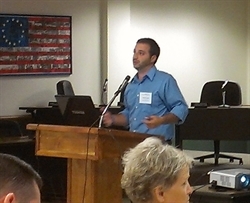
SSMMA, represented at the workshop by Dennis Latto, offers GIS mapping resources for the Calumet region.
Dennis Latto, a planner with the South Suburban Mayors and Managers Association (SSMMA), presented a great tool to help those applying for funding make the most of their resources and collaborations. Understanding that many small communities do not have the capacity to do their own GIS mapping, SSMMA created the South Suburban GIS Consortium, which allows communities to use SSMMA’s expertise to do their mapping and allow SSMMA to do mapping at a regional scale. Their GIS Atlas has some publicly available data, but if you join the consortium, you can get access to additional data. Participation is available to anyone in the Calumet region, including those in Indiana. Dennis’ presentation on the consortium is available here.
We were glad to see so many people come over to Blue Island for the workshop. We’ve already received feedback that attendees learned a lot and that people and organizations from the Calumet region genuinely appreciated the chance to hear directly from the organizations that run these programs. We hope that the workshop provided ample opportunity for networking to spur collaborative submissions and strategic partnerships—something many of these programs are looking for.
We encourage you to take advantage of these opportunities and wish you good luck with your submissions. I’ll close out this post the same way we closed out the workshop—with words of inspiration from our host, Jason Berry, Commissioner of Planning and Buildings with the City of Blue Island, quoting MPC’s Josh Ellis: Ready, set, Calumet!